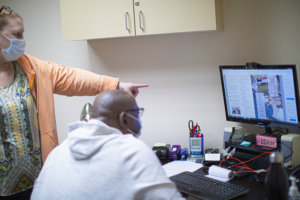Navigating Social Security can be difficult for people whose disabilities prevent them from working. So when the U.S. Senate needed an expert to explain how the process was working for everyday Americans during the COVID-19 pandemic, they brought in CCC employee Kas Causeya.
Kas manages CCC’s Benefits and Entitlements Specialists Team (BEST), a program that helps clients navigate the notoriously complicated Social Security application process so they can access the benefits they’ve earned, need and deserve.
At a recent virtual session of the U.S. Senate Committee on Finance, Kas described how pandemic barriers have made accessing social security benefits more difficult than ever — and how the BEST program has continued assisting clients despite the challenges.
Access to Social Security can transform lives

BEST program staff members like Jennifer Gambill (left) and Kas Causeya (right) work side-by-side with CCC clients to help them navigate the notoriously complicated social security application process.
Like many of CCC’s services, the BEST program opened in 2008 in response to the needs of our unhoused community members. Many of our clients experiencing or at risk of homelessness suffer from severe and persistent conditions that prevent them from earning income — and they often have no outside resources to help them survive. The small monthly benefit they might receive as Social Security income can transform their lives.
Kas describes it this way: “The $794 a month they get from SSI is still below the federal poverty level, but can open housing doors, offer the ability to get from place to place using public transportation for things like primary care appointments and counseling, offer them some hope for the future and allow them to set their own level of self-sufficiency and quality of life.”
COVID-19 complicates the process
When the pandemic forced us all into lockdown, Social Security Administration (SSA) field offices across the country were shuttered. Many application processes were moved online, and paperwork piled up at empty desks. The impact of these changes was felt the most by people who rely on Social Security benefits, especially seniors and homeless individuals without internet access.
In his testimony, Kas described some of the challenges people who are homeless or at risk of homelessness face when they can’t just walk into an office to get help. For example, without a working phone number, a mailing address or access to technology, they often miss communications from Social Security.
Too often, they end up falling through the cracks.
At CCC, the BEST program saw referrals fall over the last year, as people lost touch with the agencies that might normally connect them to services. For people who did connect with BEST, decisions from the SSA were significantly delayed. And this trend was reflected nationally. In a time of unprecedented hardship, Social Security applications across the US actually decreased, and wait times for decisions increased — so people on the brink of despair often didn’t get the help they needed.
Continuing the conversation
The pandemic revealed significant challenges at the SSA that won’t go away when offices reopen. We’re glad that Finance Committee Chair Senator Wyden and Ranking Member Senator Crapo have started this important conversation about reforming the benefits application process to make it more accessible. But this is just the beginning.
If you have personally experienced barriers during your attempt to access social security benefits, we encourage you to share your story with Senator Wyden. CCC will continue advocating for this and other changes that make a difference for our clients and our community, and the BEST program will continue their life-changing work.
CCC’s BEST program has brought life-changing benefits to 2,625 clients since 2008. But we can’t do it without your support. Please consider making a donation to help us continue to bring hope to people experiencing or at risk of homelessness.